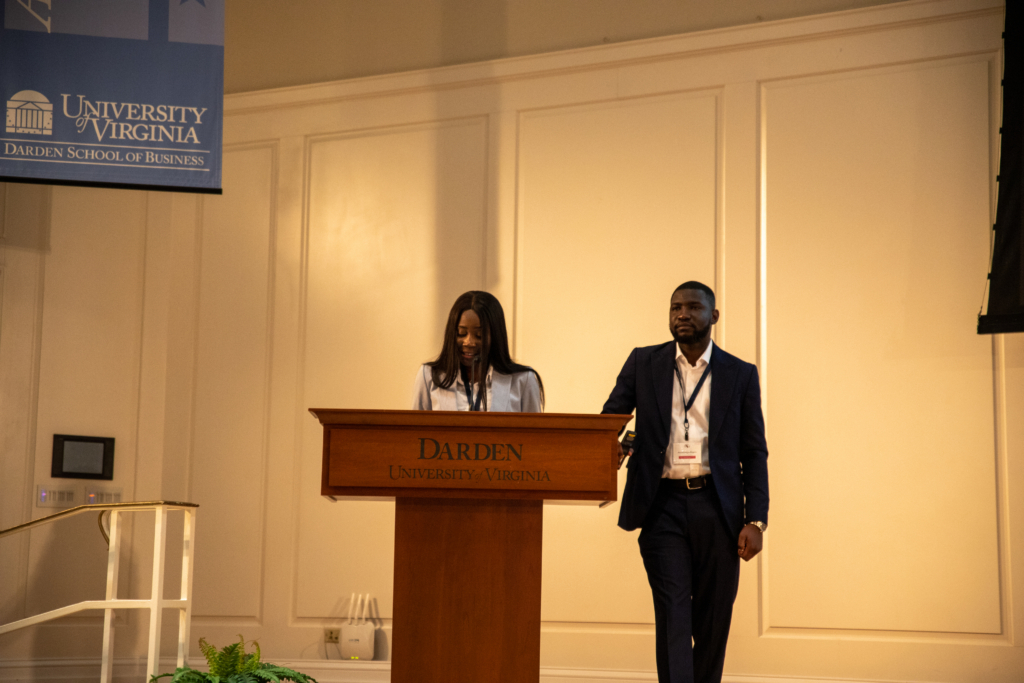Global business leaders described the boundless opportunity and enduring challenges of starting and growing enterprises in Africa at a recent conference at the University of Virginia Darden School of Business.
The event, Africa’s Future: Leveraging Technology as a Catalyst for Growth, featured leaders in sectors including tech, finance and energy describing the rapid evolution of business on the continent — as well as the difficulty in generalizing about a region composed of more than 50 countries, each with unique cultures, resources and needs.
Christian Idiodi, a partner at Silicon Valley Product Group and chair of the nonprofit Innovate Africa Foundation, encouraged attendees to think about the “natural evolution” of technology and human capital on the continent. Likening the process to one witnessed in other parts of the developing world, Idiodi said the first phase often sees top tech talent departing home countries for areas with more developed tech ecosystems; the second phase sees the growth of domestic tech hubs and an effort to keep local talent; and the third phase takes that growth and turns a focus toward solving problems and enhancing life in home counties.

Chinelo Nwagwu , vice president of the conference, and Anuoluwapo Rogers, president, provide opening remarks at the Africa’s Future: Leveraging Technology as a Catalyst for Growth event.
An increasing number of entrepreneurs and startups are working to accelerate that third phase, and Idiodi’s fellow panelist Kingsley Ndoh, founder of Hurone AI, described how context-aware artificial intelligence is already enhancing cancer care in Sub-Saharan Africa by adapting global medical standards to local realities, turning scarcity into smart, structured solutions.
Idiodi noted that many entrepreneurs are launching and growing despite contending with infrastructure “limitations” around issues such as power availability, transportation networks and internet connectivity that other parts of the world may take for granted.
Those who are successful will likely have a keen understanding of what works on the ground in their country.
“Africa is the mosaic of cultures, religions, languages,” Idiodi said. “These are nuances that are very, very distinct to Africa.”
Many attendees pointed out Africa’s immense potential for future growth, and referenced an ability not to catch up with other regions, but rather to leap ahead. The continent is expected to have the fastest growth in working age people among all regions over the next 30 years, according to the World Bank, and natural resources offer economic opportunity.
Ishaq Bolarinwa, CEO and founder of the renewable energy company Anfani, was among many stressing the need for public private partnership, and the importance of investors willing to invest in a sustainable, long-term vision.

Vice Dean and Professor Melissa Thomas-Hunt said the event was a significant endeavor and represented many of the best attributes of the “consummate” Darden experience.
“The opportunities are endless. How we can provide patient capital from [Development Finance Institutions] and commercial banks?” Bolarinwa said. “There are a lot of grants, but grants are not sustainable. What is sustainable is creating patient capital for productive use of energy…It’s not charity.”
The conference was the culmination of Africa Week, which was sponsored by the Darden African Business Organization student group and included an informative Second Coffee, a culture and cuisine event co-sponsored by the Global Business and Culture Club, and a Cold Call, among other events.
Anuoluwapo Rogers (Class of 2025), president of the Darden African Business Organization, said student organizers hoped to “create a platform where the future of Africa could be explored, where calls to action are sparked, and where those in attendance leave inspired to build the infrastructure and shape the policies needed to position Africa for a future driven by technology, innovation, and economic growth.”
Executive digital storyteller Tolani Alli with the African Development Bank Group also noted the importance of changing narratives and telling one’s own story, lest someone else tell it for you.
Student organizers credited partners and sponsors across Darden with helping to make the conference a reality, including other student groups, alumni and faculty members.
Speaking at the opening of the conference, Vice Dean and Professor Melissa Thomas-Hunt said the event was a significant endeavor and represented many of the best attributes of the Darden experience.
“The Darden African Business Organization has created a platform for dialogue, for connection, and action,” said Thomas-Hunt. “This is consummate Darden, to be a convener of a broad array of leaders and business and policy voices and perspectives … asking new questions, challenging assumptions and unlocking smarter solutions.”











